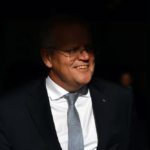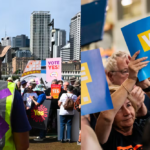How can we rebuild the community’s trust in political processes?
The issues in Australian politics today are too complex to tackle with simple yes/no or Coalition/Labor answers. Manuela Epstein from the newDemocracy Foundation says the way forward is to involve citizens as active partners with the Government at the core of decision making processes.
Barry Jones in a recent article in the Conversation identified the crisis in contemporary Australian politics as a failure to deal with “wicked problems”. Until then, I had never heard the term but it so perfectly described those complex, intractable and socially divisive polices that are ‘political dynamite’ and hence are usually left unexplored – certainly unresolved. Major infrastructure projects, long term budgetary planning, taxation, even quite fundamental questions concerning the basis of our Federation cannot be pared down to simple yes/no or Coalition/Labor issues.
At the newDemocracy Foundation we research the implementation of a deliberative democratic model of governance. Randomly chosen, ordinary citizens are given the information and training to make decisions on civic issues (read wicked problems). The ability of citizens to understand and make decisions that are sometimes counter to their self-interest, is greatly underestimated. Indeed, the public is remarkably smart if given a chance. The genius of the system is that it creates a process for collective decision-making that treats all citizens as equal – and it is highly resistant to corruption.
A dozen or more of these juries have been undertaken, and on each occasion the public policy outcomes have been universally praised. There is encouraging potential for this type of process to be incorporated into government itself. Deliberative processes are not designed as ‘peacekeeping’ exercises. Some topics are particularly controversial; however, as a research organisation, it is incumbent upon the Foundation to take on the hard projects and capture what can be learned.
In 2012, the NSW Government Public Accounts Committee commissioned newDemocracy to facilitate community input into an energy Inquiry. Citizens from across New South Wales were selected at random and invited to participate. From those who responded to the invitation, 54 were chosen, at random again, to form a citizens’ panel which was cross-checked with the population at large – to ensure demographic consistency in terms of age and gender, rural and urban. The jury met for about six days over a ten week period, listening to presentations from expert practitioners (regulators, industry, CSIRO, etc). In addition, they engaged online and downloaded relevant information such as submissions and hearings. Several of the panel’s recommendations directly influenced the Government’s policies.
Late last year, in conjunction with newDemocracy, Melbourne City Council sent out 7,500 letters to randomly selected business owners, residents and students asking them to be part of a “People’s Panel”. The final panel of 46, randomly selected to represent a broad cross-section of Melburnians, was tasked to make recommendations on how the council should prioritise spending over the next decade. The panel was given unprecedented access to the municipality’s financial books and experts and was asked to deliberate on the city’s $400m annual budget. Critics came out against this exercise attacking the $150,000 cost and accusing Council of “subcontracting” its responsibilities. This however ignores the all too common inherent dichotomy of long term planning verses short term electoral expediency.
In mid-March, newDemocracy completed one of its most challenging projects with a topic asking South Australian citizens how the 2900km south eastern drainage network should be funded. The topic was very complex and emotive. The panellists were given time to deliberate, yet despite the difficulty, there were some incredibly positive and astute points in the citizens’ report which added new insights for the Minister [of the Environment ] to consider on a topic which had previously been a political see-saw.
That citizens should be active partners with Government at the core of decision making processes is a radical idea. The new Democracy Foundation predicts that this collaboration will rebuild the community’s trust in political processes and will begin to resolve the wicked problems.
Manuela Epstein is a compulsive letter writer to newspapers and politicians about anything that piques her interest. Generally it is about politics. It was in this capacity that she initially volunteered at the newDemocracy Foundation in 2012. She now works at the Foundation as its financial and administrative officer.











